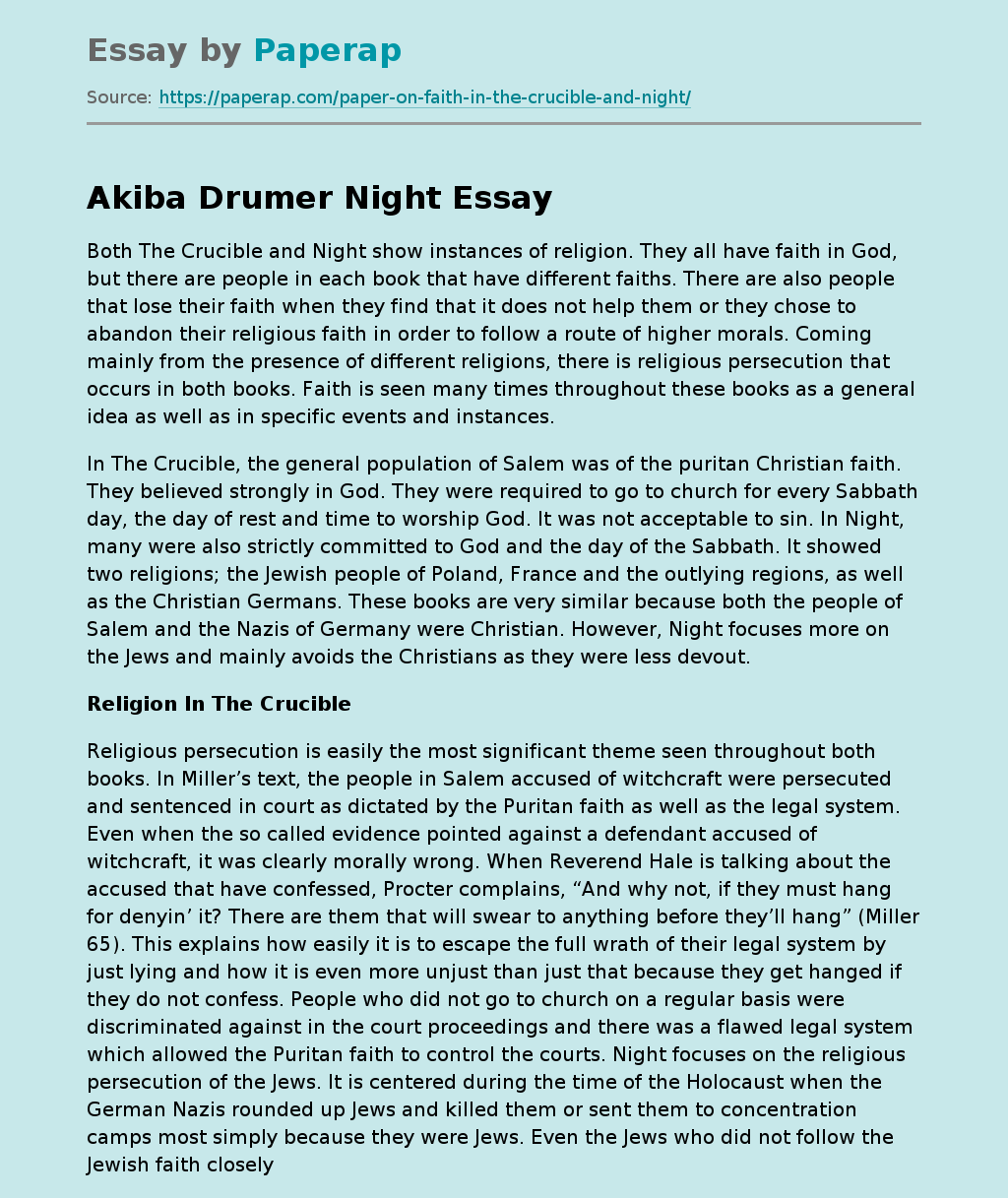Akiba Drumer Night
Both The Crucible and Night show instances of religion. They all have faith in God, but there are people in each book that have different faiths. There are also people that lose their faith when they find that it does not help them or they chose to abandon their religious faith in order to follow a route of higher morals. Coming mainly from the presence of different religions, there is religious persecution that occurs in both books. Faith is seen many times throughout these books as a general idea as well as in specific events and instances.
In The Crucible, the general population of Salem was of the puritan Christian faith. They believed strongly in God. They were required to go to church for every Sabbath day, the day of rest and time to worship God. It was not acceptable to sin. In Night, many were also strictly committed to God and the day of the Sabbath. It showed two religions; the Jewish people of Poland, France and the outlying regions, as well as the Christian Germans.
These books are very similar because both the people of Salem and the Nazis of Germany were Christian. However, Night focuses more on the Jews and mainly avoids the Christians as they were less devout.
Religion In The Crucible
Religious persecution is easily the most significant theme seen throughout both books. In Miller’s text, the people in Salem accused of witchcraft were persecuted and sentenced in court as dictated by the Puritan faith as well as the legal system.
Even when the so called evidence pointed against a defendant accused of witchcraft, it was clearly morally wrong. When Reverend Hale is talking about the accused that have confessed, Procter complains, “And why not, if they must hang for denyin’ it? There are them that will swear to anything before they’ll hang” (Miller 65). This explains how easily it is to escape the full wrath of their legal system by just lying and how it is even more unjust than just that because they get hanged if they do not confess. People who did not go to church on a regular basis were discriminated against in the court proceedings and there was a flawed legal system which allowed the Puritan faith to control the courts. Night focuses on the religious persecution of the Jews. It is centered during the time of the Holocaust when the German Nazis rounded up Jews and killed them or sent them to concentration camps most simply because they were Jews. Even the Jews who did not follow the Jewish faith closely but came from a Jewish descent were persecuted.
Eventually, throughout both books, people began losing their faith. First they just started questioning their faith in God, wondering where it had gotten them. Then they questioned their faith in themselves, wishing that they were in a better place. Finally they gave up their faith in life, secretly or openly wishing to be dead and not caring if their life were to be taken away. In Wiesel’s memoir, the Jewish people under oppression from the German SS and Gestapo began to degrade their mental faith. They asked themselves why – if God existed and supported them – could something so terrible have happened as what occurred in the concentration camps. Elie asked “Blessed be God’s name? Why, but why would I bless Him? …
Because He kept six crematoria working day and night, including Sabbath and the Holy Days? Because in His great might, He had created Auschwitz, Birkenau, Buna, and so many other factories of death?” (Wiesel 67). That marked the start of Elie’s loss of faith. Later on in Night when the survivors feel that they have survived for too long, they start questioning why they should continue to live. They lose faith in the prospects of life and consider that death must be better than living in Hell. Akiba Drumer says near the end of his life “’I can’t go on…It’s over…’ We tried to raise his spirits, but he wouldn’t listen to anything we said. He just kept repeating that it was all over for him, that he could no longer fight, he had no more strength, no more faith” (76).
In The Crucible, defendants who could not keep the moral stamina to support their lies to the court eventually broke down. They lost faith in the church and its policies. Even Proctor eventually broke from the path of perfection to admit guilt of adultery. He also started to question the value of his life and decided to uphold his good name instead of keeping his life. “Procter: Because it is my name! Because I cannot have another in my life! Because I lie and sign myself to lies…How may I live without my name? I have given you my soul; leave me my name! (Miller 133).
Faith is a recurring message in these books seen in many forms. The authors look at religious faith, personal faith, and people’s faith in others. The numerous examples of faith clarify how existent it is and both books reveal errors in all of the faiths observed.
Akiba Drumer Night. (2019, Dec 05). Retrieved from https://paperap.com/paper-on-faith-in-the-crucible-and-night/

